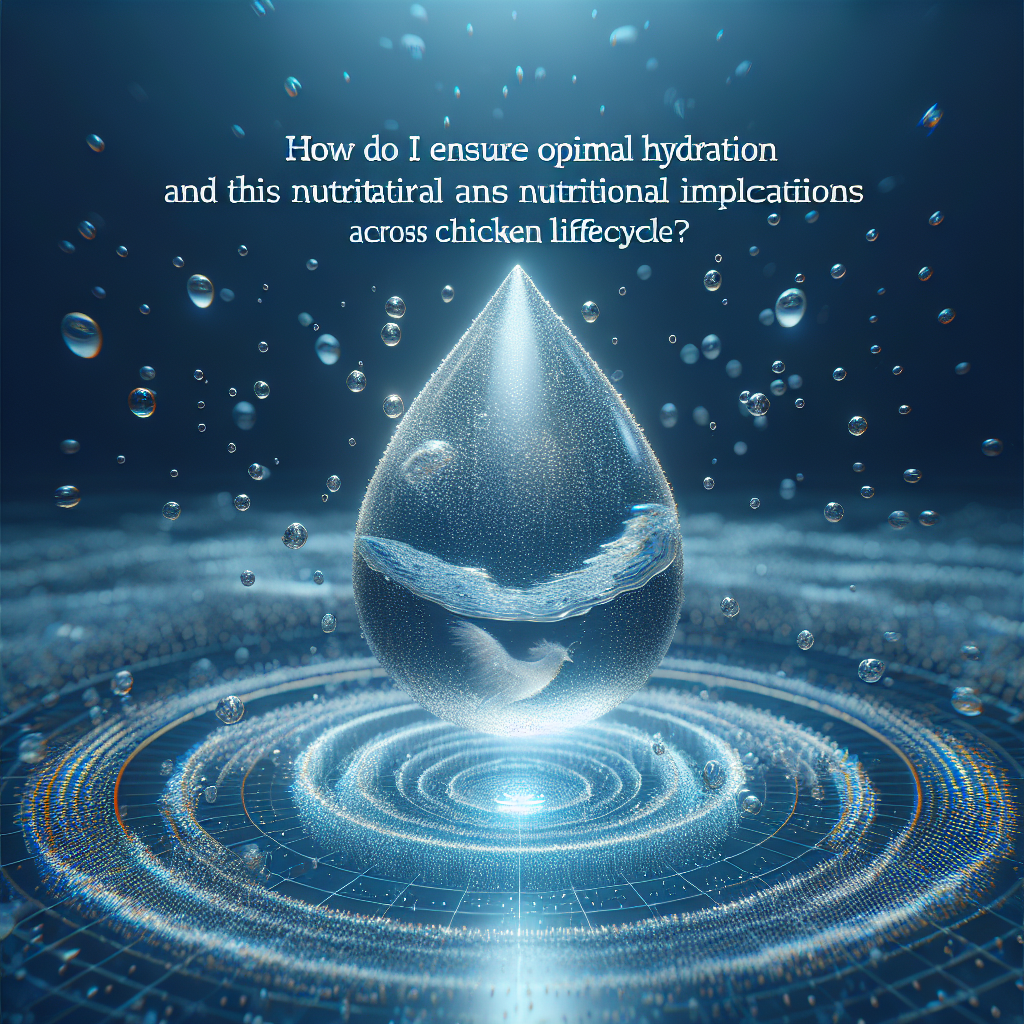In this article, we will explore the benefits of probiotics for chickens and discover the best ways to incorporate them into their diet. We will take a closer look at the positive effects that probiotics can have on the overall health and well-being of these feathered friends. So, if you’re curious to learn more about how probiotics can support the health of chickens, keep reading!
Benefits of Probiotics for Chickens
Enhancement of Digestive Health
Probiotics are known for their ability to promote a healthy gut in various animals, including chickens. By introducing beneficial bacteria into the chicken’s digestive system, probiotics can help maintain a balanced microbial population and improve overall digestive health. This can lead to better nutrient absorption, reduced inflammation, and decreased risk of common digestive issues such as diarrhea and uneven growth.
Boosting Immune System
A robust immune system is essential for chickens to thrive and resist diseases. Probiotics have been shown to enhance the immune response in chickens by stimulating the production of immune cells and promoting the secretion of antibodies. This increased immune activity can improve the chicken’s ability to fight off infections and reduce the need for antibiotics in poultry production.
Improving Nutrient Absorption
Chickens rely on efficient nutrient absorption to support their growth and development. Probiotics play a crucial role in enhancing nutrient absorption by breaking down complex compounds in the diet and producing enzymes that aid in digestion. This allows chickens to extract more nutrients from their feed, leading to improved growth rates, better feed conversion, and increased overall productivity.
Types of Probiotics for Chickens
Lactic Acid Bacteria
Lactic acid bacteria (LAB) are one of the most commonly used types of probiotics for chickens. These bacteria, including species like Lactobacillus and Enterococcus, are known for their ability to produce lactic acid, which helps create an acidic environment in the chicken’s gut. The acidic environment is unfavorable for harmful pathogens, promoting the growth of beneficial bacteria and supporting optimal digestive health in chickens.
Bacillus spp.
Bacillus spp. are spore-forming bacteria that have been extensively studied for their probiotic properties in poultry. These bacteria can form a protective spore that allows them to survive in harsh conditions, including heat and acidic environments. Bacillus spp. have been shown to improve nutrient digestibility, enhance immune function, and reduce the risk of intestinal disorders in chickens.
Saccharomyces cerevisiae
Saccharomyces cerevisiae is a type of yeast that has been widely used as a probiotic for chickens. This yeast helps maintain a healthy gut environment by producing organic acids and enzymes that support digestion. Saccharomyces cerevisiae has also been found to enhance the absorption of nutrients such as amino acids and vitamins, leading to improved growth performance in chickens.
Factors Affecting Probiotic Effectiveness
Strain Selection
Choosing the right strain of probiotics is crucial for achieving optimal results in chickens. Different strains of bacteria and yeasts have varying abilities to survive and colonize the chicken’s gut. It is important to select strains that are well-adapted to the chicken’s intestinal environment and have proven probiotic properties.
Administration Timing
The timing of probiotic administration can significantly impact its effectiveness. Probiotics should ideally be given during critical periods of a chicken’s life, such as during hatching, weaning, or periods of stress. By providing probiotics at the right time, their beneficial effects on digestive health and immune function can be maximized.
Environmental Conditions
Environmental factors, such as temperature and humidity, can influence the survival and efficacy of probiotics in the chicken’s gut. It is important to consider the specific environmental conditions in the poultry facility and choose probiotics that can withstand those conditions. Additionally, providing a clean and hygienic environment for the chickens can help create an optimal environment for probiotics to thrive.
Including Probiotics in Chicken’s Diet
Choosing the Right Probiotic Supplements
When including probiotics in a chicken’s diet, it is essential to choose high-quality probiotic supplements that contain viable and effective strains of bacteria or yeast. Look for products that have undergone rigorous testing and have proven efficacy in poultry. Consult with a veterinarian or poultry nutritionist to ensure the selected probiotic supplement meets the specific needs of the chickens.
Determining Appropriate Dosage
The dosage of probiotics for chickens can vary depending on factors such as age, weight, and health status. It is important to follow the recommended dosage guidelines provided by the probiotic manufacturer or seek guidance from a veterinarian. Overdosing probiotics may not provide additional benefits and can be wasteful, while underdosing may not yield the desired results.
Administering Probiotics
Probiotics can be administered to chickens in different ways, including through oral administration, feed supplementation, or water administration. The chosen administration method should be practical and ensure that the chickens receive an adequate dosage of probiotics. It is important to follow proper hygiene practices when administering probiotics to prevent contamination.
Duration of Probiotic Use
Probiotics should not be considered a one-time solution but rather a long-term management strategy for maintaining optimal gut health in chickens. The duration of probiotic use can depend on various factors, such as the specific condition being targeted, the age of the chickens, and the overall health status. Consult with a veterinarian or poultry nutritionist to determine the appropriate duration of probiotic supplementation.
Recommended Probiotic Administration Methods
Oral Administration
Oral administration involves directly delivering probiotics to the chicken’s mouth, either through a syringe or by mixing with a carrier substance. This method allows for precise dosing and is often used for treating specific health conditions or providing probiotic support during critical periods, such as after antibiotic treatment.
Feed Supplementation
Feed supplementation involves mixing probiotics into the chicken’s regular feed. This method is commonly used in commercial poultry production as it allows for uniform distribution of probiotics and ensures that all chickens receive the intended dosage. Probiotics can be added to the feed either as dry powders or as liquid formulations.
Water Administration
Water administration involves adding probiotics to the chicken’s drinking water. This method is convenient and suitable for large-scale poultry operations where individual dosing may not be practical. However, it is important to ensure that the probiotics are stable and viable in the water and that the water supply is free from contaminants.
Potential Risks and Side Effects
Contamination
Probiotic supplements can potentially be contaminated with harmful bacteria or other pathogens if proper manufacturing, handling, and storage practices are not followed. It is essential to choose reputable manufacturers and carefully assess the quality and safety measures taken by the probiotic supplier.
Unbalanced Gut Microbiota
While probiotics aim to restore a healthy microbial balance in the chicken’s gut, excessive or inappropriate use of probiotics can disrupt the natural microbiota. It is crucial to use probiotics judiciously and follow recommended dosage guidelines to avoid causing an imbalance in the gut microbiota.
Allergic Reactions
In rare cases, chickens may develop allergic reactions to certain strains of probiotics. Symptoms of an allergic reaction may include diarrhea, skin rash, or difficulty breathing. If any of these symptoms occur after administering probiotics, discontinue use and consult with a veterinarian immediately.
Research and Studies on Probiotics for Chickens
Effectiveness in Broiler Chickens
Numerous studies have demonstrated the beneficial effects of probiotics in broiler chickens, including improved growth performance, enhanced immune function, and reduced incidences of digestive disorders. Probiotics have also been shown to contribute to the reduction of antibiotic use in broiler production systems, supporting sustainable and environmentally friendly poultry farming practices.
Probiotics for Layer Hens
The use of probiotics in layer hens has shown promising results in terms of improving egg quality, increasing egg production, and reducing the occurrence of eggshell abnormalities. Probiotics can also help prevent or manage common health issues in layer hens, such as reproductive disorders and intestinal infections.
Application in Organic Poultry Farming
Probiotics offer a natural and sustainable solution for organic poultry farmers who aim to minimize the use of antibiotics and synthetic additives. Probiotics can help improve the health and productivity of organically raised chickens, ensuring compliance with organic farming standards and meeting consumer demand for organic poultry products.
Regulatory Considerations for Probiotics in Poultry
Laws and Regulations
The use of probiotics in poultry is subject to regulations that vary between countries and regions. It is important for poultry farmers to familiarize themselves with the local laws and regulations governing the use of probiotics and ensure compliance with labeling, safety, and efficacy requirements.
Labeling Requirements
Probiotic supplements for poultry must comply with specific labeling requirements to provide accurate and transparent information to consumers. Labels should include details such as the strain(s) of probiotics, guaranteed minimum viable count, and clear instructions for use. It is essential to choose probiotic supplements that meet the labeling requirements of the target market.
Practical Tips for Including Probiotics in Chicken’s Diet
Consultation with a Veterinarian
Before introducing probiotics into a chicken’s diet, it is advisable to consult with a veterinarian or poultry nutritionist. They can provide guidance on selecting appropriate probiotics, determining the right dosage, and incorporating probiotics into the overall feeding program.
Start with Small Amounts
When introducing probiotics to chickens, it is recommended to start with small amounts and gradually increase the dosage. This allows the chickens to adjust to the new bacteria or yeast and minimizes the risk of digestive disturbances.
Monitor Chicken’s Health and Behavior
Regular monitoring of the chicken’s health and behavior is crucial when incorporating probiotics into their diet. Watch for any signs of digestive issues, allergic reactions, or changes in egg production. If any abnormal behavior or health concerns arise, consult with a veterinarian for proper evaluation and guidance.
Consider Feed Formulation
When formulating the chicken’s feed, consider factors such as the type of probiotics being used and their compatibility with other feed ingredients. The inclusion of prebiotics, which are non-digestible compounds that promote the growth of beneficial bacteria, can also enhance the effectiveness of probiotics in the chicken’s gut.
Conclusion
Probiotics offer numerous benefits for chickens, including enhanced digestive health, a boosted immune system, and improved nutrient absorption. By choosing the right probiotic supplements, determining appropriate dosages, and administering probiotics through practical methods, poultry farmers can optimize the effect of probiotics in their flocks. Additionally, regular monitoring, consultation with professionals, and adherence to regulatory requirements are essential for the successful integration of probiotics into a chicken’s diet. With careful consideration and implementation, probiotics can contribute to the overall health and productivity of chickens and promote sustainable poultry farming practices.




